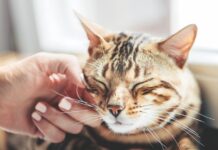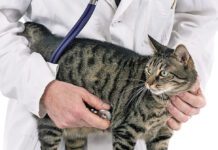FIV Secret Shoppers
One problem with some tests for feline immunodeficiency virus (FIV) – including the ELISA, western blot and immunofluorescent antibody tests – is that they cant distinguish real FIV antibodies from the antibodies that result from whole-virus vaccinations against FIV. This so-called false-positive problem makes some cat owners fear that their pets actually have the disease they were vaccinated against. (See related article in CatWatch, July 2005.)
Reporting in the Journal of the American Veterinary Medical Association (Vol. 226, No. 9), researchers at the University of Florida and Texas A&M University tell how they played secret shopper to test American and Canadian laboratories that offer an alternative test for FIV.
Polymerase chain reaction (PCR) assays for FIV are touted as being more accurate. So the researchers sent to the labs blood samples from three categories of cats: those that were known for sure to be neither infected nor vaccinated, cats known to be non-infected but previously vaccinated with the whole-virus vaccine, and cats that actually had the infection.
The result: Still too many false-positives, the researchers said, concluding that PCR assays . . . vary significantly in diagnostic accuracy and do not resolve the diagnostic issues resulting from FIV vaccination against FIV in cats.
———-
Beyond Brushing
Luckily for cats, some products do work as advertised, according to researchers reporting in the Journal of Veterinary Dentistry (Vol. 22, No. 1). Among all the dental homecare programs offered to control plaque accumulation and gingivitis as well as periodontal disease in cats, the report said these are effective: dental foods with textural characteristics, zinc ascorbate and dental foods or treats with polyphosphates.
But the most effective homecare program to keep cats teeth and gums healthy between regular visits to the veterinarian is the much dreaded brushing. Open wide, Fluffy: This will probably hurt me more than it annoys you.
———-
Putting a Price on Pets
When a Seattle District Court judge awarded $45,480 in damages to a cat owner whose 12-year-old shorthair, Yofi, was killed by a neighbors dog, legal scholars checked the record books and veterinarians checked their malpractice insurance.
Although veterinary malpractice was not involved in the Yofi case (rather, the owner of the chow served 21 days in jail), the $30,000 value placed on the cat tied a California malpractice award for a dog (Bluestone v. Bergstrom).
And its about time society recognized that cats count, too, said the lawyer for the 71-year-old retired schoolteacher who is still mourning Yofi. I think there tends to be a culture that says dogs are more of a mans best friend and cats are aloof and cant bond, said attorney Adam P. Karp, also an adjunct professor of animal law at Seattle University. But if anyone has ever shared a bond with a cat, they know thats utter nonsense.
Besides the replacement value of the cat, the court ordered the dog owner to pay $15,000 for emotional distress, $170 in medical costs and cremation charges, and $24.12 in interest. Legal researchers cited other pet-loss verdicts, including $25,000 for a horse and pet goats in Washington State, and $10,000 for emotional distress when a Schnauzer escaped from a groomer in Texas and was hit in traffic.
Concerned for veterinarians who might be charged with negligence, an official in the Washington State Veterinary Medical Association said the Yofi verdict does have the potential to set up awards for the value of animals.



